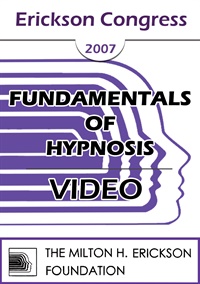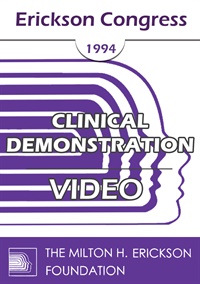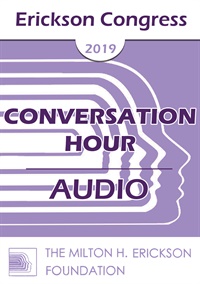
- Average Rating:
- Not yet rated
- Topic Areas:
- Conversation Hours | Hypnosis | Trance | Ideomotor
- Categories:
- Erickson Congress | Erickson Congress 2019
- Faculty:
- Stephen Lankton, MSW
- Duration:
- 54 Minutes
- Format:
- Audio Only
- Original Program Date:
- Dec 14, 2019
- Short Description:
- Often students use hypnosis as a context for creating a safe or comfortable state of mind, suggesting away symptoms, or uncomplicated ego-strengthening by bolstering encouragement. This is little more than psycho-education done in trance. But hypnosis offers opportunities for far more therapeutic intervention. This open discussion format will help participants dig into this area and develop some expanded possibilities for therapy during hypnosis.
- Price:
- $15.00 - Base Price
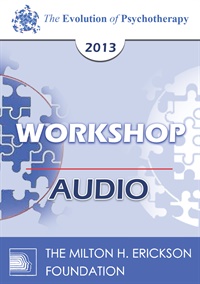
- Average Rating:
- Not yet rated
- Topic Areas:
- Consciousness | Psychotherapy | Workshops | Four-Stage Creative Process | Neuroscience | Hypnosis | Research
- Categories:
- Evolution of Psychotherapy | Evolution of Psychotherapy 2013
- Faculty:
- Ernest Rossi, PhD | Kathryn Rossi, PhD | Giovanna Celia, PhD | David Atkinson, MD
- Duration:
- 2 Hours 29 Minutes
- Format:
- Audio Only
- Original Program Date:
- Dec 12, 2013
- Short Description:
- This session ranges widely across psychotherapy, neuroscience, hypnosis, and clinical experience, inviting participants to think differently about how change actually happens. Moving between research, theory, and extended demonstrations, it explores brain plasticity, gene expression, creativity, and the role of altered states in therapeutic transformation. Along the way, the work challenges traditional models of hypnosis and emphasizes self-directed change, inner resources, and the subtle ways consciousness reshapes mind and body over time.
- Price:
- $15.00 - Base Price
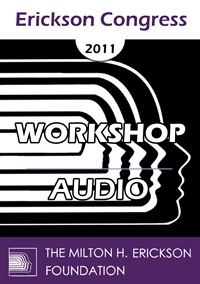
- Average Rating:
- Not yet rated
- Topic Areas:
- Hypnosis | Workshops | Self-Hypnosis | Unconscious Processes | Ideomotor
- Categories:
- Erickson Congress | Erickson Congress 2011
- Faculty:
- Sidney Rosen, MD
- Duration:
- 59 Minutes
- Format:
- Audio Only
- Original Program Date:
- Dec 09, 2011
- Short Description:
- We will explore and experience many ways of communicating with, and receiving feedback from, our “unconscious min” through “automatic” bodily movements and sensations. These responses can confirm, predict and validate the effectiveness of auto-suggestions given without the need of a “trance” experience.
- Price:
- $20.00 - Base Price
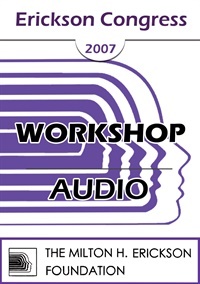
- Average Rating:
- Not yet rated
- Topic Areas:
- Workshops | Consciousness | Hypnosis | Healing | Meditation, Spirituality and Yoga
- Categories:
- Erickson Congress | Erickson Congress 2007
- Faculty:
- Philip Accaria, PhD | Philip Appel, PhD
- Duration:
- 1:34:10
- Format:
- Audio Only
- Original Program Date:
- Dec 09, 2007
- Short Description:
- This workshop offers an immersive introduction to experiential energy work, blending hypnosis, subtle perception and hands-on exercises. Participants learn to sense energy fields, notice shifts linked to emotional states, and experiment with seeing and hearing symbolic information that emerges from these impressions. Through live demonstrations of chakra work, muscle testing, and guided partner exercises, the session encourages curiosity, intuition and embodied awareness, giving clinicians a vivid taste of how energetic methods can deepen therapeutic presence and connection.
- Price:
- $15.00 - Base Price
- Average Rating:
- Not yet rated
- Topic Areas:
- Fundamentals of Hypnosis | Hypnosis | Resources
- Categories:
- Erickson Congress | Erickson Congress 2007
- Faculty:
- Michael Yapko, PhD
- Course Levels:
- Master Degree or Higher in Health-Related Field
- Duration:
- 1:21:47
- Format:
- Audio and Video
- Original Program Date:
- Dec 07, 2007
- Short Description:
- This training introduces the fundamentals of hypnosis and the Ericksonian method of using trance to access personal resources. Participants learn how to guide clients in recalling positive experiences, amplifying useful strengths, and extending them into future situations. Through demonstration and practice, the workshop teaches practical techniques such as age regression, reframing, and post-hypnotic suggestion, offering a structured, empowering approach to facilitate insight, resilience, and change.
- Price:
-
Sale is $29.00
price reduced from Base Price - $59.00
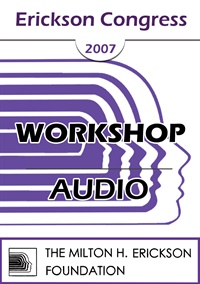
- Average Rating:
- Not yet rated
- Topic Areas:
- Workshops | Hypnotherapy | Therapist Development | Energy Psychology | Clinical Process
- Categories:
- Erickson Congress | Erickson Congress 2007
- Faculty:
- Philip Accaria, PhD | Philip Appel, PhD
- Duration:
- 1:56:01
- Format:
- Audio Only
- Original Program Date:
- Dec 06, 2007
- Short Description:
- In this workshop, Drs. Accaria and Appel will discuss their use of energy-based medicine techniques and how they integrate them into their clinical and hypnotherapy practices. Topics addressed will include: how to introduce energy-based methods to clients; how to determine with which clients to use these methods; how the clinician might market/advertise his/her use of energy-based techniques.
- Price:
- $15.00 - Base Price
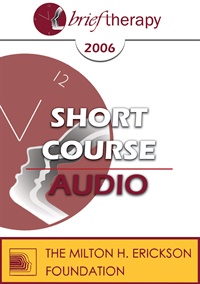
- Average Rating:
- Not yet rated
- Topic Areas:
- Short Courses | Addiction | Brief Therapy | Communication | Mind-Body | Utilization
- Categories:
- Brief Therapy Conference | Brief Therapy Conference 2006
- Faculty:
- Bart Walsh, MSW
- Duration:
- 1:19:30
- Format:
- Audio Only
- Original Program Date:
- Dec 07, 2006
- Short Description:
- This presentation poses a brief substance abuse treatment which acknowledges and accommodates the personal needs being addressed by substance use, bypasses perceived resistance and employs the essence of idiosyncratic psychobiological learning to achieve a body-mind gestalt complementary to the client's sobriety. Client self-empowerment and relapse prevention are built into the intervention. This method develops a safe framework for addressing any subsequent mental health themes directly or indirectly related to substance misuse. A particular form of body language known as ideomotor signaling is established in this procedure.
- Price:
- $15.00 - Base Price
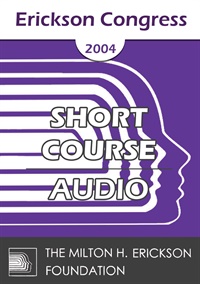
- Average Rating:
- Not yet rated
- Topic Areas:
- Short Courses | Utilization | Addiction | Abuse
- Categories:
- Erickson Congress | Erickson Congress 2004
- Faculty:
- Bart Walsh, MSW
- Duration:
- 1:19:37
- Format:
- Audio Only
- Original Program Date:
- Dec 02, 2004
- Short Description:
- This workshop poses a brief substance abuse treatment which acknowledges and accommodates the personal needs being addressed by substance abuse. Client self-empowerment and relapse prevention are built into the intervention. This method develops a safe framework for addressing any subsequent mental health themes directly or indirectly related to substance misuse. A particular form of body language know as ideomotor signaling is established in this procedure.
- Price:
- $15.00 - Base Price
Tags: Abuse Addiction Utilization Ideomotor
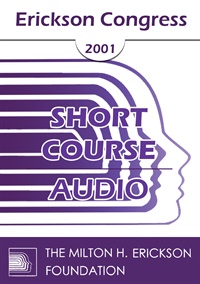
- Average Rating:
- Not yet rated
- Topic Areas:
- Short Courses | Addiction | Utilization | Abuse | Brief Therapy | Ideomotor
- Categories:
- Erickson Congress 2001 | Erickson Congress
- Faculty:
- Bart Walsh, MSW
- Duration:
- 1:20:20
- Format:
- Audio Only
- Original Program Date:
- Dec 06, 2001
- Short Description:
- This presentation poses a substance abuse treatment which acknowledges and accommodates the personal needs being addressed by substance use, bypasses perceived resistance and employs idiosyncratic psycho-biological learning to achieve a body-mind gestalt complementary to the client's sobriety. Client self-empowerment and relapse prevention are built into the intervention. This method develops a safe framework for addressing any subsequent mental health themes directly or indirectly related to substance misuse. Ideomotor questioning is employed in this procedure.
- Price:
- $15.00 - Base Price
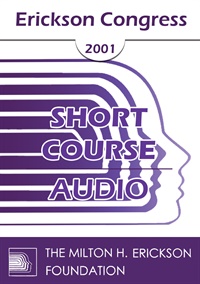
- Average Rating:
- Not yet rated
- Topic Areas:
- Short Courses | Affect | Ideomotor | Brief Therapy
- Categories:
- Erickson Congress 2001 | Erickson Congress
- Faculty:
- Bart Walsh, MSW
- Duration:
- 1:14:27
- Format:
- Audio Only
- Original Program Date:
- Dec 06, 2001
- Short Description:
- This workshop presents a structured protocol for resolving repressed, suppressed or otherwise dated affect using ideomotor questioning. Essential to this model is a progressive ratification series that addresses affect, cognition and behavior. A questioning tree illustrates a Socratic means of affect inquiry. This non-invasive, brief procedure is a useful adjunct to other treatment modalities and instrumental in clarifying the focus of treatment.
- Price:
- $15.00 - Base Price
Tags: Ideomotor Brief Therapy
- Average Rating:
- Not yet rated
- Topic Areas:
- Clinical Demonstrations | Ideomotor | Age Regression
- Categories:
- Erickson Congress | Erickson Congress 1994
- Faculty:
- David Cheek, MD
- Course Levels:
- Master Degree or Higher in Health-Related Field
- Duration:
- 1:02:29
- Format:
- Audio and Video
- Original Program Date:
- Dec 10, 1994
- Short Description:
- IC94 Clinical Demonstration 10 - IDEOMOTOR METHOD OF SEARCHING BIRTH MEMORIES - David Cheek, M.D.
- Price:
-
Sale is $29.00
price reduced from Base Price - $59.00
Tags: Age Regression Ideomotor


